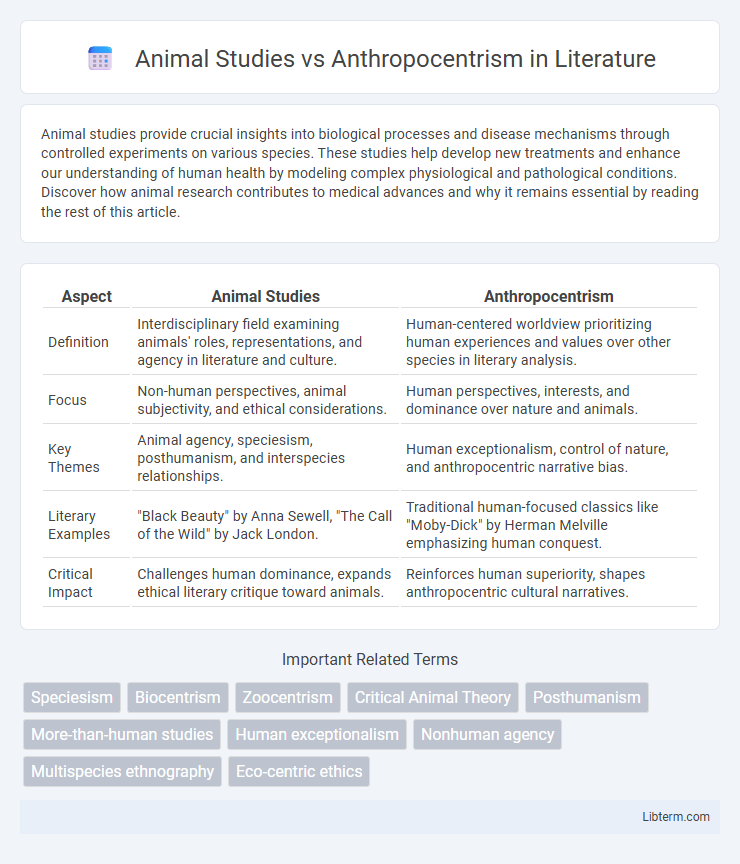Animal studies provide crucial insights into biological processes and disease mechanisms through controlled experiments on various species. These studies help develop new treatments and enhance our understanding of human health by modeling complex physiological and pathological conditions. Discover how animal research contributes to medical advances and why it remains essential by reading the rest of this article.
Table of Comparison
| Aspect | Animal Studies | Anthropocentrism |
|---|---|---|
| Definition | Interdisciplinary field examining animals' roles, representations, and agency in literature and culture. | Human-centered worldview prioritizing human experiences and values over other species in literary analysis. |
| Focus | Non-human perspectives, animal subjectivity, and ethical considerations. | Human perspectives, interests, and dominance over nature and animals. |
| Key Themes | Animal agency, speciesism, posthumanism, and interspecies relationships. | Human exceptionalism, control of nature, and anthropocentric narrative bias. |
| Literary Examples | "Black Beauty" by Anna Sewell, "The Call of the Wild" by Jack London. | Traditional human-focused classics like "Moby-Dick" by Herman Melville emphasizing human conquest. |
| Critical Impact | Challenges human dominance, expands ethical literary critique toward animals. | Reinforces human superiority, shapes anthropocentric cultural narratives. |
Understanding Animal Studies: A New Academic Paradigm
Animal Studies emerge as a groundbreaking academic paradigm challenging traditional Anthropocentrism by emphasizing non-human animals' intrinsic value and agency. This interdisciplinary field incorporates philosophy, ethics, ecology, and social sciences to critique human-centered worldviews and advocate for equitable consideration of animal experiences. Understanding Animal Studies requires recognizing its role in reshaping ethical frameworks and influencing environmental policies through a more inclusive and compassionate lens.
Defining Anthropocentrism: Human-Centered Worldviews
Anthropocentrism defines a human-centered worldview that prioritizes human interests and values over those of non-human animals and the environment. This perspective often leads to the marginalization of animal rights and ecological concerns in favor of human welfare and progress. Animal studies critically challenge anthropocentrism by emphasizing the intrinsic value and agency of animals beyond their utility to humans.
Historical Roots: Emergence of Animal Studies
Animal Studies emerged in the late 20th century as an interdisciplinary field challenging anthropocentrism, which places humans at the center of moral and philosophical concern. Rooted in ethical debates sparked by Peter Singer's 1975 work "Animal Liberation," the movement critiques the traditional human-animal hierarchy established since Cartesian dualism in the 17th century. The rise of Animal Studies repositions animals as subjects with intrinsic value, disrupting centuries of human-centered perspectives dominating philosophy, literature, and science.
Anthropocentrism in Literature and Culture
Anthropocentrism in literature and culture centers human experiences as the primary lens for interpreting the world, often marginalizing non-human perspectives and ecological interconnectedness. This worldview shapes narrative structures and symbolic meanings, reinforcing human dominance and control over nature. Critiques from Animal Studies challenge these anthropocentric frameworks by advocating for the recognition of animal agency and the ethical implications of human-animal relationships in cultural texts.
Questioning Human Exceptionalism
Animal studies challenge anthropocentrism by questioning human exceptionalism, emphasizing the cognitive, emotional, and social capacities shared between humans and non-human animals. This critical perspective disrupts traditional hierarchies that place humans above other species, promoting ethical considerations and rights for animals based on their intrinsic value rather than utility. The field integrates interdisciplinary research from biology, philosophy, and ethics to deconstruct human-centered worldviews and advocate for more inclusive, non-speciesist approaches.
Ethics of Animal Representation
The ethics of animal representation challenges anthropocentrism by advocating for the recognition of non-human animals as sentient beings with intrinsic value beyond human utility. Animal Studies emphasize ethical considerations in portraying animals, promoting accurate, respectful, and non-exploitative depictions that resist objectification and commodification. This shift fosters a more inclusive ethical framework that critiques human-centered biases and supports animal rights and welfare in cultural narratives.
Interdisciplinary Approaches: Beyond Species Boundaries
Interdisciplinary approaches in animal studies challenge anthropocentrism by integrating insights from biology, philosophy, and cultural studies to explore non-human agency and cognition beyond species boundaries. These frameworks emphasize ecological interconnectedness, ethical considerations, and the social construction of species hierarchies. By combining methodologies from ethology, environmental science, and critical theory, researchers foster a holistic understanding of multispecies relationships that transcends human-centered perspectives.
Critiques of Anthropocentrism in Science and Philosophy
Critiques of anthropocentrism in science and philosophy emphasize the limitations of human-centered perspectives in understanding non-human animals and ecosystems. Scholars argue that anthropocentrism marginalizes animal agency, leading to ethical blind spots and flawed ecological theories. By promoting a more inclusive and multispecies approach, these critiques advocate for recognizing intrinsic animal value beyond human utility.
Rethinking Human-Animal Relationships
Rethinking human-animal relationships challenges the traditional anthropocentric view that places humans at the center of moral and ecological consideration, advocating for recognizing animals as sentient beings with intrinsic value. Animal studies emphasize ethical frameworks that dissolve hierarchical distinctions between species, promoting coexistence and ecological balance. This shift encourages interdisciplinary research integrating philosophy, ecology, and cognitive science to redefine humanity's role within the broader biosphere.
The Future of Animal Studies in a Post-Anthropocentric World
The future of animal studies in a post-anthropocentric world emphasizes decentering human perspectives to explore multispecies coexistence and nonhuman agency. Emerging research integrates ecological ethics, animal cognition, and environmental humanities, advocating for the recognition of animals as autonomous subjects within shared ecosystems. This shift challenges traditional anthropocentric narratives by promoting interdisciplinary frameworks that foreground animal rights, welfare, and their intrinsic value beyond human utility.
Animal Studies Infographic

 libterm.com
libterm.com